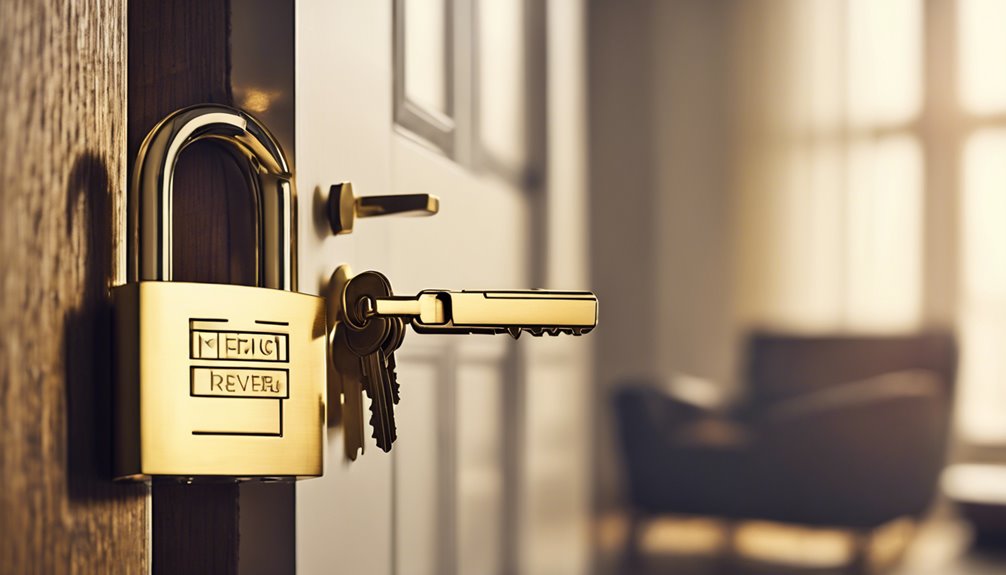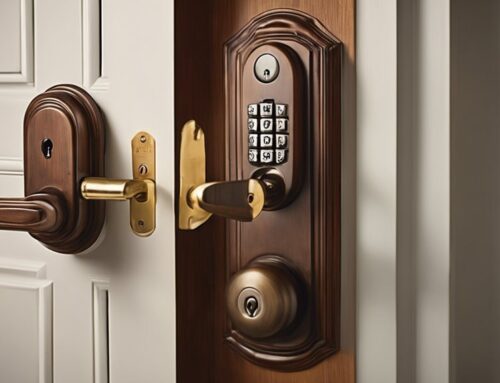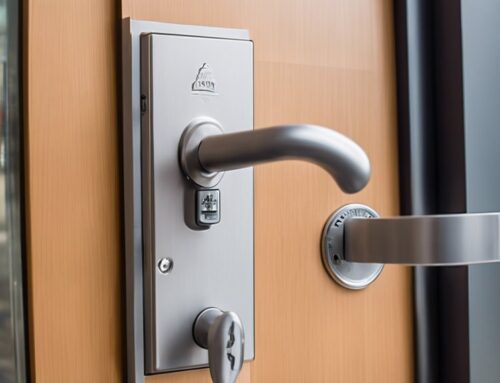Maneuvering the maze of legal obligations regarding rekeying locks in New Jersey rental properties can feel like walking a tightrope. You need to know your rights as a tenant or responsibilities as a landlord, especially when it comes to timely responses and emergency protocols. Understanding these guidelines not only safeguards everyone's security but also helps maintain healthy landlord-tenant relationships. Are you aware of the specific scenarios in which tenants can take matters into their own hands?
Key Takeaways
- Landlords are not legally required to rekey between tenants but are strongly encouraged to enhance security and tenant safety.
- Tenants may request a lock change in writing, and landlords must respond within 48 hours by changing the locks.
- If landlords fail to act on a tenant's request for rekeying, the tenant can rekey immediately and must provide copies of new keys.
- Emergency rekeying by tenants is allowed without prior consent if there's an imminent threat, followed by written notice.
- Documentation of all lock changes, requests, and communications is essential for legal compliance and protection of tenant rights.
General Prohibitions on Lock Changes

When managing rental properties in New Jersey, it's vital to understand the general prohibitions on changing locks, as failing to comply can lead to serious legal ramifications. Changing locks without providing a new key to your tenant is illegal. In fact, if you attempt to lock out a tenant without a court judgment, you're committing an illegal lockout. In New Jersey, lock changes are governed by specific laws designed to protect tenant rights and prevent unlawful evictions. Locksmiths in New Jersey must adhere to legal guidelines and cannot change locks during eviction unless they have proper authorization.
Remember, you must adhere to proper eviction protocols, as lockouts can result in significant legal trouble. During an active lease, you can't change locks to force a tenant out. If you need to change locks, it must be with the intention of providing the tenant access to their property. You're required to furnish new keys immediately upon changing the locks; otherwise, you risk violating tenant rights.
Additionally, keep in mind that in situations involving domestic violence, a court may order you to change the locks. In these cases, the court can even mandate reimbursement for the costs of lock changes, ensuring victims' rights are upheld. Always comply with court orders and relevant statutes regarding lock changes. Victims must notify landlords in writing about the restraining order, which is crucial for proper compliance.
Notification is also important; if you change locks, you must notify your tenant and deliver the new keys. If a tenant changes locks in response to domestic violence, they need to inform you within 48 hours.
Importance of Rekeying Between Tenants
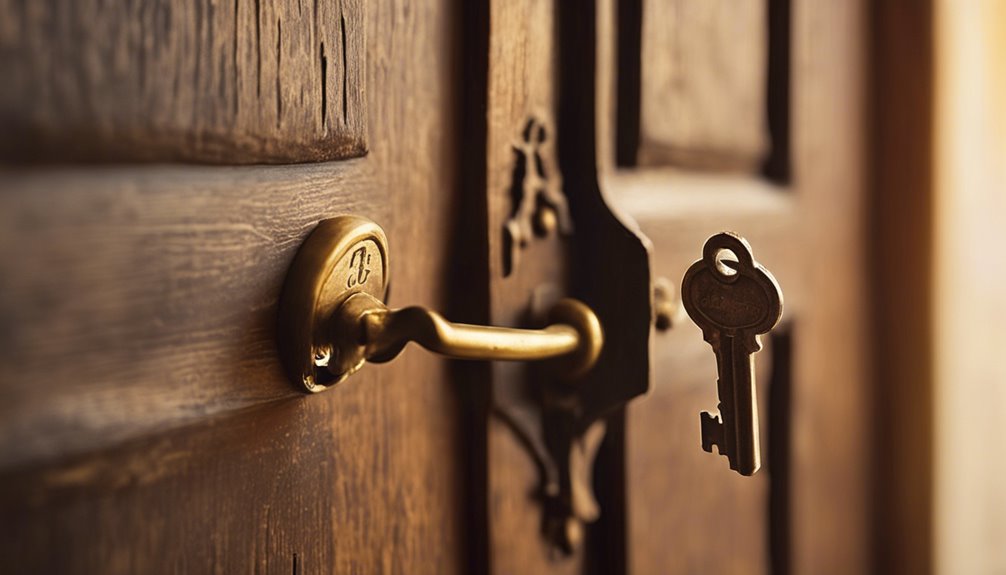
Changing locks may have strict regulations, but rekeying between tenants is a practical measure that greatly enhances security and peace of mind. As a landlord, it's important to guarantee that the outgoing tenant no longer has access to the property. By rekeying, you prevent potential entries by previous tenants or anyone who might've a copy of the key. This ensures that new tenants are the sole key holders, considerably reducing the risk of unauthorized access, which could lead to theft or property damage.
Protecting tenant safety is a paramount responsibility you hold. Rekeying eliminates the chances of confrontations or unexpected entries by former tenants, creating a safe living environment for new residents. It shows your commitment to their well-being, fostering trust and satisfaction. Moreover, rekeying is advisable even though there is no law mandating it, reinforcing your dedication to tenant security. Additionally, landlords in New Jersey should consider locksmith licensing requirements when hiring professionals for rekeying services, ensuring compliance and quality. Locksmiths must understand the legal framework surrounding key duplication to avoid legal issues.
Moreover, rekeying acts as a deterrent against criminal activity. It sends a clear message that unauthorized access won't be tolerated, enhancing the overall security of your property and making it less appealing to potential intruders. This proactive approach not only secures your property but also contributes to a safer neighborhood.
Finally, maintaining the integrity of your rental property is essential. Rekeying minimizes risks related to property damage or unauthorized use of facilities, ensuring all locks function properly. This professionalism reinforces your reputation as a responsible landlord and decreases liability issues.
Ultimately, rekeying isn't just a legal obligation, but a crucial step in fostering a secure, peaceful, and trusting living environment for your tenants.
Domestic Violence Lock Change Policies
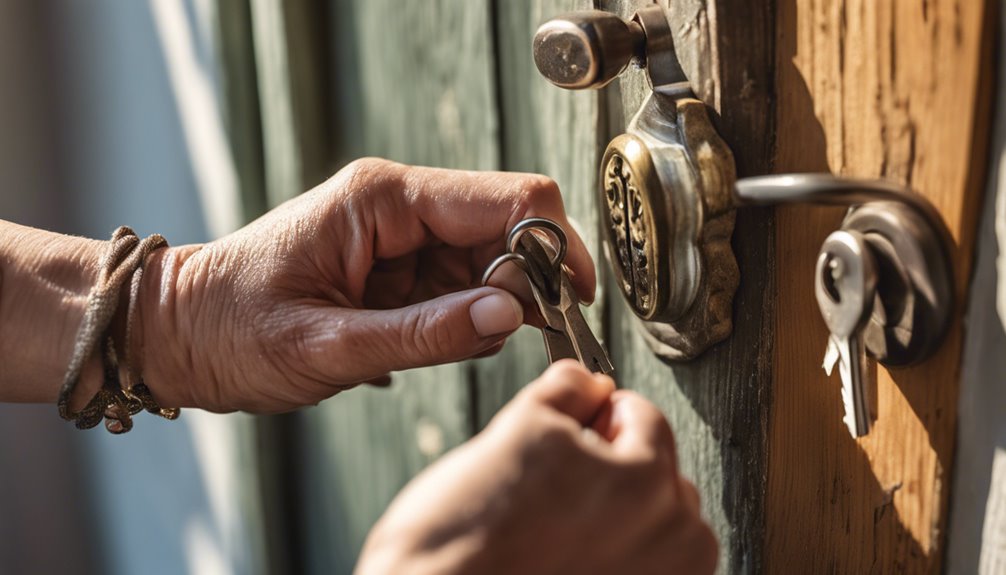
Domestic violence lock change policies in New Jersey provide vital protections for tenants facing unsafe situations. Under the state's legal framework, as established by the "Prevention of Domestic Violence Act of 1991," victims with temporary or permanent restraining orders have the right to change locks on their rental units. This measure is essential in safeguarding your safety, particularly when a perpetrator is a co-tenant. To ensure compliance with the state's lock safety standards, it's important to be aware of the specific requirements for both commercial and residential properties. In New Jersey, these standards include guidelines for the installation and maintenance of high-security locks to prevent unauthorized access.
To initiate a lock change, you must notify your landlord in writing. Once you submit your request, the landlord has 48 hours to change the locks. If they fail to act within this timeframe, you're authorized to change the locks yourself. However, you must inform the landlord and provide them with new keys within another 48 hours to keep them in the loop.
While you'll initially bear the costs of changing the locks, there's a path for recovery. You can seek reimbursement from the perpetrator through the court, which may order them to cover those expenses. It is important to remember that landlords must understand their new legal obligations regarding lock changes to ensure compliance with the law.
It's significant to mention that landlords aren't liable for any damages or injuries occurring after lock changes made by you, the victim. Additionally, landlords are prohibited from terminating or refusing to renew your lease based on your status as a domestic violence victim. They must respond promptly to lock change requests, aligning with their new responsibilities to guarantee your safety and peace of mind.
Understanding these policies empowers you to operate within your rights and secure your living environment.
Tenant Requests for Lock Changes
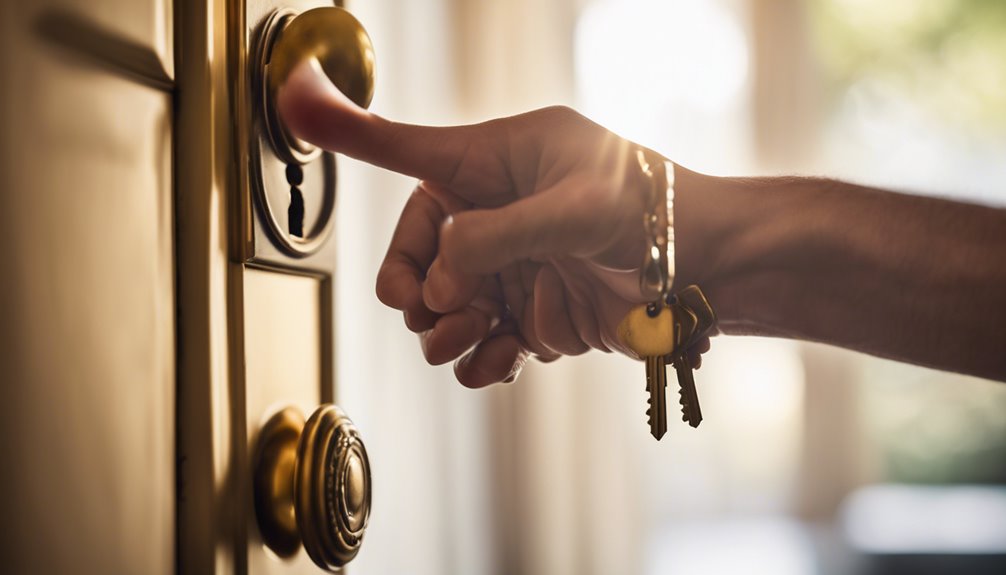
When you request a change of locks, you need to provide written notification to your landlord outlining your reasons. In emergencies, however, you may have the right to change the locks without prior consent but must still inform your landlord afterward. Understanding these requirements guarantees you're compliant while maintaining your security. For locksmiths operating in New Jersey, it's important to understand the legalities around lock picking laws to ensure all practices are permissible and tools are used legally. Many locksmith service providers offer 24/7 availability and fast response times, making them a reliable source of support for emergency lock changes.
Tenant Notification Requirement
If you're a tenant in New Jersey and need to change your locks due to safety concerns, it's vital to understand the notification requirement that comes into play. Under the "Prevention of Domestic Violence Act of 1991," you must notify your landlord in writing before making any changes. This guarantees compliance and clarity around lock modifications. To ensure ADA compliance for locks, businesses in New Jersey should familiarize themselves with the specific standards set by the act. It is important to note that licensed locksmith services in New Jersey ensure the security and legality of your lock changes, as all technicians must adhere to state regulations. Here's a quick overview:
| Action | Requirement | Timeframe |
|---|---|---|
| Notify landlord of lock change | Must be in writing, stating intention & reason | Promptly, before change |
| Landlord response | Install new locks | Within 48 hours |
| Tenant need after landlord's delay | Authorized to change locks | Immediately if no action |
| Provide keys after change | Notify landlord & give copies of new keys | Within 48 hours |
| Cost responsibility | Tenant pays for lock change | Possible reimbursement from perpetrator |
Failure to follow these steps can lead to liability issues, so keep your landlord informed and proactive about your safety needs. Balancing security with your landlord's access is essential for a harmonious living arrangement.
Emergency Lock Changes
Safety is a top priority for tenants, especially those who may be experiencing threats or harassment. If you have a temporary or permanent restraining order due to domestic violence, you can request an emergency lock change. You must submit a written request to your landlord, who's required to change the locks within 48 hours.
If your landlord fails to act promptly, you have the right to change the locks yourself. You're responsible for covering the costs unless a court orders reimbursement from the perpetrator.
After changing the locks, inform your landlord and provide them with new keys within 48 hours, ensuring they can still access the property.
Your lease may outline specific policies regarding lock changes, so be sure to review it beforehand. While changing locks without permission can lead to legal issues, this provision is designed to protect your rights and safety in urgent situations. Locksmiths in New Jersey should be aware of the essential employment laws, which cover areas like wages and working conditions, to ensure compliance while providing such services.
Always document communications and actions taken regarding lock changes to maintain a clear record. Ultimately, these regulations are in place to empower you, ensuring you can take immediate steps toward your safety in challenging circumstances.
Emergency Lock Change Protocols

Emergency lock change protocols are essential for guaranteeing tenant safety in urgent situations, such as instances of domestic violence or imminent security threats. If you find yourself in a threatening environment, these protocols guide both you and your landlord through necessary actions to secure your safety and well-being.
Emergency Lock Change Protocols
| Action | Tenant Responsibility | Landlord Responsibility |
|---|---|---|
| Request to Change Locks | Notify the landlord in writing | Respond within 48 hours |
| Lock Change Timeline | Change locks if no response in 48 hours | Install new locks if requested |
| Cost of Lock Change | Responsible for costs, may seek reimbursement | Not liable for damages after tenant changes locks |
| Key Provision | Provide landlord with new keys within 48 hours | Must receive notification of the change |
| Security Enforcement | Change locks during imminent threat | Guarantee compliance with court orders if applicable |
In critical situations, you can act swiftly. You're allowed to change locks immediately if you face an immediate security risk. However, maintaining communication with your landlord is crucial; inform them of the change and guarantee they receive a copy of the new keys promptly.
If you've obtained a temporary or permanent restraining order, you have solid grounds for requesting a lock change. Your safety takes precedence, and understanding these protocols empowers you to enforce your rights effectively while protecting yourself and any co-tenants who may be affected.
Handling Damaged Locks

After securing immediate safety through effective lock change protocols, addressing damaged locks becomes a priority for both tenants and landlords. Understanding your responsibilities is key.
Landlords aren't legally required to rekey locks between tenants but should do so for security. If locks sustain damage due to tenant negligence, you're liable for the repair costs, which the landlord can charge you directly or deduct from your security deposit.
As a landlord, maintaining secure locks is your duty. Verify you document any damage and associated costs to substantiate future charges to your tenant. The lease agreement should clearly outline who bears the financial responsibility for lock repairs or rekeying.
Remember, routine maintenance costs, including rekeying between tenancies, typically fall to landlords.
If you find yourself needing to change a lock, communication is essential. Tenants generally need permission from the landlord for any lock changes unless an emergency arises. If you've changed locks without permission, you must provide your landlord with a new key promptly.
Special circumstances, like domestic violence situations, allow tenants to request lock changes without prior approval, though they must inform the landlord and provide a new key.
Always notify your landlord of any lock damage immediately to expedite repairs. Neglecting to do so can lead to misunderstandings and possibly penalties.
Understanding these guidelines helps maintain a secure and harmonious living environment for everyone involved.
Legal Procedures for Eviction
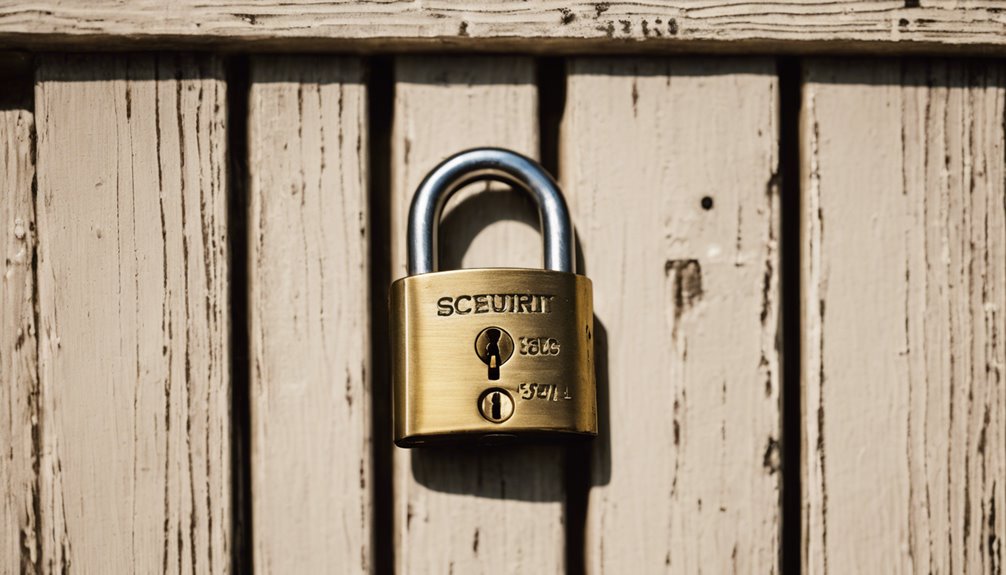
How do you navigate the complex legal procedures for eviction in New Jersey?
First, you must issue an eviction notice, tailored to the reason for eviction. For non-payment of rent, you'll provide a five-day grace period with no late fees. Lease violations require a 30-day written notice, while disorderly conduct warrants at least three days of notice. If illegal activities are involved, you'll serve a swift three-day eviction notice.
Next, file a verified complaint in court. This document should outline the prior notice you gave the tenant and justify the eviction. Accompany the complaint with a summons to inform the tenant. Expect to pay a filing fee, typically between $90 and $150, and be prepared for a waiting period of two to three weeks for your hearing.
During court proceedings, make sure the tenant is served by an authorized individual, not you. While the tenant isn't obligated to respond, attending the hearing is essential for presenting their case. You should come prepared with substantial evidence, including documents and witnesses.
If the court rules in your favor, you'll receive a judgment for possession. After three days, you can apply for an eviction order. The tenant has three business days to vacate. If they don't comply, a special civil part officer will handle the eviction.
Compliance With Local Ordinances
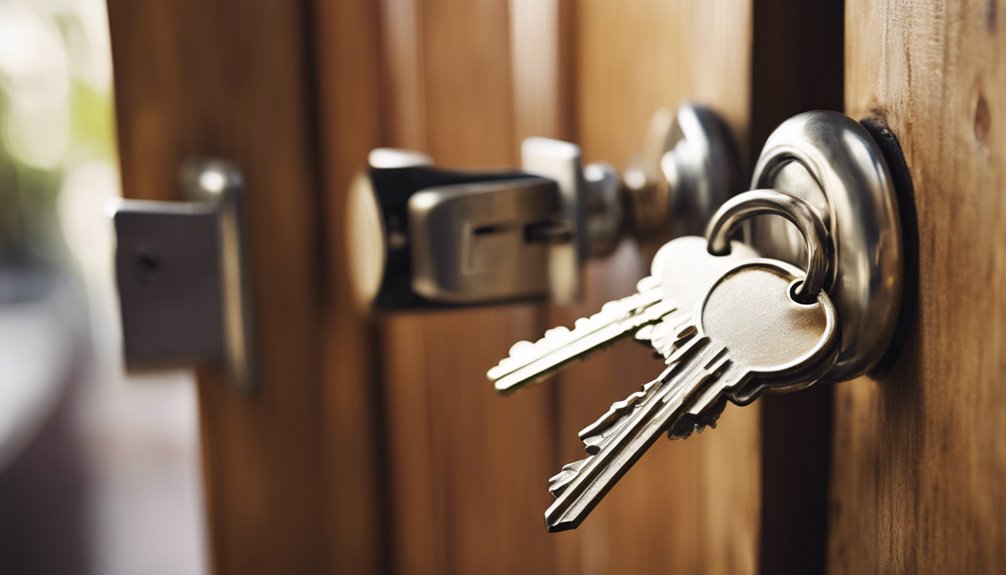
While there's no uniform state law mandating landlords to rekey rental properties between tenants in New Jersey, compliance with local ordinances can greatly impact your responsibilities as a property owner. Be aware that sometimes local laws dictate specific procedures for changing locks, particularly in cases involving tenant safety and security.
Here's a quick comparison of requirements across various New Jersey municipalities:
| Local Ordinance | Tenant Lock Change | Landlord Lock Change |
|---|---|---|
| Newark | Request required, with order of protection | Only with tenant consent |
| Jersey City | Must notify landlord | Must provide new keys |
| Paterson | Emergency change allowed | Must follow tenant request |
| Elizabeth | Changes after 30 days | Must maintain lock security |
| Trenton | Must provide landlord key | Only change with notification |
Since local regulations can vary considerably, it's essential to check with your municipality before taking action. Also, even though you're not legally required to change locks or rekey between tenants, doing so is a best practice for protecting both your property and your tenants. Keep in mind that if tenants change locks without permission, you could face complications, including deducting rekeying costs from their security deposit as stated in the lease. Ultimately, compliance with local ordinances not only fosters a sense of security but also helps you avoid potential disputes with tenants. Always make sure that your lease agreements reflect these local stipulations clearly.
Security Responsibilities of Landlords
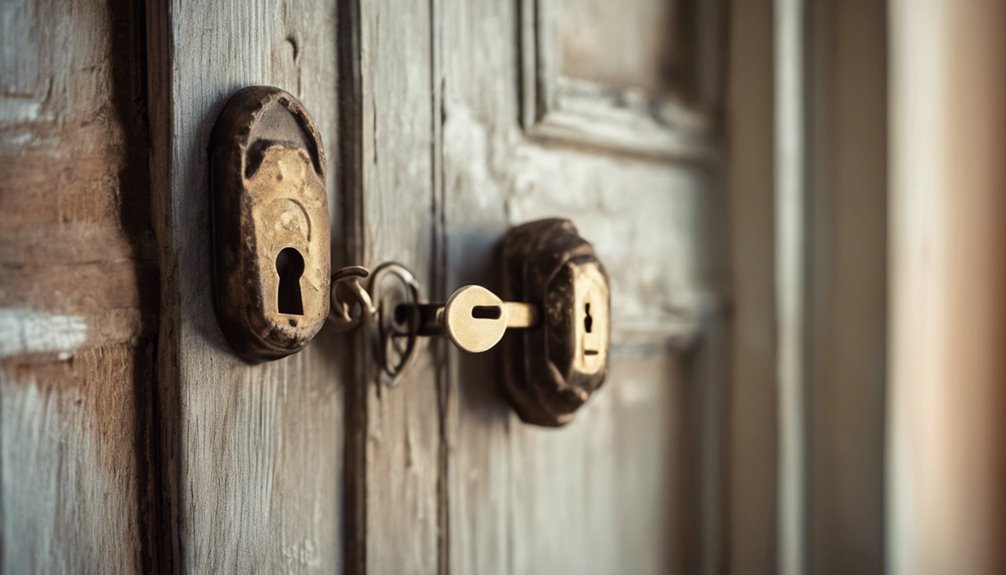
As a landlord, you have a critical responsibility to guarantee the safety and security of your tenants.
This includes understanding proper lock change procedures and implementing consistent security maintenance practices.
Addressing these obligations not only protects your tenants but also minimizes your liability as a property owner.
Tenant Safety Obligations
Landlords have an essential responsibility to guarantee tenant safety, which includes maintaining secure and operational locks throughout the rental property. Compliance with city, state, and federal housing codes is non-negotiable, and this includes ensuring all locks are functional and secure.
If you neglect to maintain these safety measures, tenant safety and privacy could be compromised, leaving you liable for damages if any harm occurs due to dangerous conditions.
Regular inspections and maintenance are important to meet these obligations. Municipal property maintenance codes dictate rules regarding locks and access control, so it's your duty to adhere to them.
Tenants deserve exclusive possession of their homes, and unauthorized access can violate their rights. You can only enter the premises under specific circumstances, such as obtaining tenant permission or addressing emergencies.
In emergency situations—like a break-in—it's essential to act swiftly to restore security. Tenants will expect prompt responses to their lock change requests if they express safety concerns.
Lock Change Procedures
When tenants request a lock change for safety reasons, it's crucial to follow established procedures to secure compliance and maintain security.
First, confirm tenants submit their request in writing. This transparency not only fosters compliance with local laws but also provides a clear record of the request.
Upon receipt, you have 48 hours to install new locks. If you fail to do so, the tenant is authorized to change the locks themselves.
If tenants choose to change the locks, they must inform you within 48 hours and provide you with copies of the new keys.
Remember, maintaining the rental premises in safe condition is your responsibility. Avoid any actions that may be perceived as eviction tactics, such as changing locks without proper notification, which typically requires a 24-48 hour notice period.
Moreover, clarify cost responsibilities in the lease agreement to avoid disputes. Generally, tenants are accountable for the lock change costs unless a court decides otherwise.
Familiarize yourself with local regulations to confirm compliance and uphold tenant security, including any specific requirements for lock features or key management.
Always aim for clear communication throughout this process.
Security Maintenance Practices
While maintaining a rental property, ensuring security is a fundamental responsibility that directly impacts tenant safety and well-being. You must keep the property in safe and decent condition, adhering to all housing and health codes. This includes ensuring that the locks are functional and meet minimum security standards, as any failure to address dangerous conditions could result in liability if a tenant is harmed.
It's essential to comply with local property maintenance codes, including disclosures about damage and safety issues. You should also respect tenant privacy; entering a rental unit without appropriate notice or justification can lead to claims of harassment. When emergencies arise, you must provide timely access while maintaining boundaries.
Ultimately, every lease carries an "implied warranty of habitability." You're responsible for maintaining the property's safety and habitability, from pest control to ensuring proper heating.
Documentation and Record Keeping

Effective documentation and record keeping are vital for maintaining compliance with New Jersey regulations regarding lock changes in rental properties. Keeping accurate records helps protect both landlords and tenants by guaranteeing clarity and minimizing disputes. Here's a simple table to guide you through the essential documentation needed:
| Documentation Type | Responsibility | Purpose |
|---|---|---|
| Court Orders | Tenant (Notify in writing) | Evidence for lock change necessity |
| Written Requests | Tenant | Formal request for lock modification |
| Notification of Changes | Tenant | Inform landlord of lock changes |
| Record of New Keys | Landlord | Maintain access security |
| Compliance Documentation | Landlord | Show adherence to legal requirements |
Guarantee that you keep thorough records of all lock changes, including dates, reasons, and required approvals. This helps in compliance with state and local regulations, particularly if lock changes relate to domestic violence situations. Document these changes in the lease agreement to prevent potential disputes over authorizations or responsibilities later.
As a landlord, you should also establish clear communication protocols with tenants. Written confirmations regarding changes or requests are vital. Tenants, for their part, should maintain copies of all correspondence regarding lock modifications. This mutual diligence fosters a transparent relationship and guarantees everyone's rights and responsibilities are protected.
Frequently Asked Questions
Can Tenants Change Locks Without Notifying Landlords?
You generally can't change locks without notifying your landlord first. Most leases require you to inform them before any alterations.
However, if you're facing certain safety issues, there may be exceptions. Even so, it's vital to communicate promptly and provide keys to avoid potential legal problems.
Being proactive about notification helps maintain a good relationship with your landlord and guarantees you protect your rights while keeping your living space secure.
Are There Penalties for Landlords Who Fail to Change Locks?
Imagine living in a castle with no moat—it's risky, right?
While there aren't specific penalties for landlords who fail to change locks, negligence can expose them to legal consequences if prior tenants' spare keys lead to security breaches.
Maintaining a safe property is essential; falling short can result in lawsuits or insurance issues.
What if a Tenant Changes Locks and Does Not Provide Keys?
If you change the locks without providing keys to your landlord, you may face consequences.
Your landlord could deduct the costs of reinstalling the original locks from your security deposit. Additionally, you might breach your lease agreement, leading to potential legal action.
It's essential to check your lease terms and communicate with your landlord about any lock changes to avoid disputes and guarantee compliance with the regulations in your jurisdiction.
Unauthorized key copies alone won't typically lead to eviction.
To justify an eviction, landlords must demonstrate substantial lease violations, like nonpayment or property damage.
If unauthorized key copies exist, it's crucial to assess if they constitute a significant breach of lease terms.
Always keep communication lines open with your landlord; misunderstandings can often be resolved without escalating to eviction, which can have serious long-term consequences for both parties involved.
How Often Should Landlords Rekey Between Tenants?
As a landlord, you should consider rekeying locks each time a tenant moves out.
This not only enhances security but also protects your property from unauthorized access by former tenants or their acquaintances.
Frequent rekeying keeps your rental unit appealing to new tenants, showcasing your commitment to safety.
While it's not a strict legal requirement, taking this proactive step can greatly reduce potential security risks and foster trust between you and your tenants.
Conclusion
In conclusion, understanding New Jersey's legal guidelines for rekeying locks is essential for both tenants and landlords. Like a sturdy lock that safeguards your home, adhering to these regulations protects tenant safety and maintains landlord-tenant trust. By responding promptly to lock change requests and recognizing the importance of security, you can foster a safer living environment. Remember, clear documentation and compliance with local ordinances not only fulfill legal obligations but also enhance your peace of mind.

